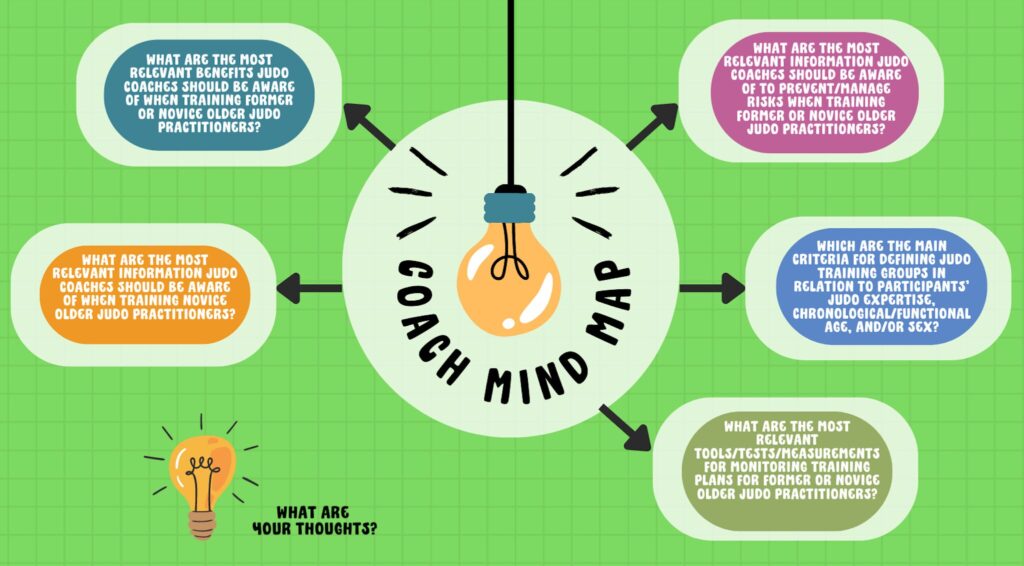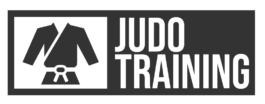Educational Needs for Coaching Judo in Older Adults
Coaches’ preparedness for structuring and monitoring safe and effective sports programs for older individuals is a crucial component.
The EDJCO research team that we’re part of engaged in a thorough discussion and identified five main themes, as shown in the picture, to gather expert opinions and knowledge.
Overall, 88 experts provided their answers. The initial list of 262 statements was synthesized, validated, analyzed, and organized into a final list of 55 statements and six macro-areas and sub-groups:
- Aging Process
- Safety and First Aid
- Physiology and Fitness
- Psychology and Mental Health
- Organization and Environment
- Teaching and Training
The present international eminence-based study investigated the experts’ perspectives regarding the necessity of tailored education for judo coaches of older practitioners, harmonizing diverse intercultural perspectives.
Palumbo, F.; Ciaccioni, S.; Guidotti, F.; Forte, R.; Galea, E.; Sacripanti, A.; Lampe, N.; Lampe, Š.; Jelušić, T.; Bradić, S.; et al. Educational Needs for Coaching Judo in Older Adults: The EdJCO Focus Groups. Sports 2023, 11, 143.

ABSTRACT
Judo coaches are urged to develop specific competencies and skills for addressing the special needs of older practitioners. Thus, the purpose of this study was to investigate the experts’ opinions on judo training in late adulthood to develop sound educational programs for coaches of older judo practitioners. Overall, eighty-eight experts from an international consortium of judo and educational partners participated in national focus groups. During the focus groups, experts discussed five themes and generated statements pertinent to educate coaches to support older judo practitioners (e.g., benefits; necessary knowledge; risks; training groups definition; tools; and tests for monitoring training plans). The initial list of 262 statements was synthesized, validated, analyzed, and organized into a final list of 55 statements and six macro-areas: aging process (n = 10); safety and first aid (n = 6); physiology and fitness (n = 12); psychology and mental health (n = 11); organization and environment (n = 5); adapted judo teaching and training (n = 11). The present international eminence-based study, harmonizing diverse intercultural perspectives, highlighted the specific needs of older judo practitioners. The results of this study will contribute to the structure of a sound educational program for coaches of older judo practitioners to enhance the quality of older adults’ sports experiences by linking safety, enjoyment, social interactions, and learning principles.
Keywords: judo; martial arts; older individuals; coaches; successful aging; focus groups
Download the full article HERE.
More articles related HERE.



Valuable information. Fortunate me I found your site by chance, and I am surprised why this coincidence didn’t took place in advance! I bookmarked it.
Excellent website. Plenty of useful info here. I am sending it to a few friends ans also sharing in delicious. And certainly, thanks for your effort!
What抯 Happening i’m new to this, I stumbled upon this I’ve found It positively useful and it has aided me out loads. I hope to contribute & help other users like its helped me. Good job.
I just like the helpful info you provide for your articles. I will bookmark your blog and check once more right here regularly. I’m rather sure I will learn plenty of new stuff proper right here! Best of luck for the following!
I was very pleased to seek out this net-site.I needed to thanks on your time for this glorious read!! I positively having fun with every little little bit of it and I have you bookmarked to take a look at new stuff you blog post.
Your travel insights go beyond the typical tourist experience. Thanks for sharing the hidden gems and unique perspectives that make each journey memorable.
Pretty great post. I simply stumbled upon your blog and
wanted to mention that I have truly loved browsing your weblog posts.
In any case I’ll be subscribing to your feed and I hope you write again very
soon!
знакомства в торезе для интима секс вечеринки караганда
молодежное порно на камеру в европе порно в метро
pin-up https://azerbaijancuisine.com/# pin up onlayn kazino
pin up apk yukle
pharmacies in mexico that ship to usa mexican pharmacy online medication from mexico pharmacy
mexican mail order pharmacies mexican pharmacy mexico drug stores pharmacies
п»їbest mexican online pharmacies mexican pharmacy northern doctors mexican border pharmacies shipping to usa
https://northern-doctors.org/# medicine in mexico pharmacies
buying prescription drugs in mexico northern doctors mexican drugstore online
http://northern-doctors.org/# mexico pharmacies prescription drugs
mexican mail order pharmacies: mexican pharmacy – best online pharmacies in mexico
https://northern-doctors.org/# medicine in mexico pharmacies
mexican mail order pharmacies: northern doctors – buying prescription drugs in mexico online
https://northern-doctors.org/# mexican pharmacy
http://northern-doctors.org/# buying from online mexican pharmacy
mexican border pharmacies shipping to usa mexican pharmacy mexican mail order pharmacies
https://northern-doctors.org/# best online pharmacies in mexico
https://northern-doctors.org/# mexican drugstore online
https://northern-doctors.org/# medication from mexico pharmacy
mexico pharmacies prescription drugs mexican pharmacy northern doctors mexico drug stores pharmacies
https://northern-doctors.org/# mexican rx online
mexican drugstore online: mexican mail order pharmacies – mexican pharmacy
https://northern-doctors.org/# mexico drug stores pharmacies
https://northern-doctors.org/# mexico drug stores pharmacies
https://northern-doctors.org/# mexican rx online
best online pharmacies in mexico mexican northern doctors mexico pharmacies prescription drugs
mexican mail order pharmacies: mexican pharmacy northern doctors – mexican rx online
mexico pharmacy cmqpharma.com buying from online mexican pharmacy
mexico drug stores pharmacies online mexican pharmacy buying prescription drugs in mexico online
mexican drugstore online cmq mexican pharmacy online mexican drugstore online
reputable mexican pharmacies online mexican pharmacy mexican border pharmacies shipping to usa
mexican mail order pharmacies: cmq pharma mexican pharmacy – medicine in mexico pharmacies
mexico pharmacies prescription drugs cmqpharma.com medicine in mexico pharmacies
purple pharmacy mexico price list online mexican pharmacy mexico drug stores pharmacies
mexican drugstore online mexican pharmacy online reputable mexican pharmacies online
mexican mail order pharmacies
https://cmqpharma.com/# mexico drug stores pharmacies
buying prescription drugs in mexico
mexican pharmaceuticals online mexican pharmacy medication from mexico pharmacy
medication from mexico pharmacy cmq mexican pharmacy online mexican border pharmacies shipping to usa
buying from online mexican pharmacy cmq pharma mexican pharmacy mexico drug stores pharmacies
pharmacies in mexico that ship to usa mexican pharmacy mexican rx online
mexican pharmaceuticals online: mexican drugstore online – reputable mexican pharmacies online
https://canadapharmast.online/# canadian pharmacy scam
reputable mexican pharmacies online mexican mail order pharmacies п»їbest mexican online pharmacies
pharmacies in canada that ship to the us: canadian drugs online – best online canadian pharmacy
indian pharmacy: best india pharmacy – п»їlegitimate online pharmacies india
medicine in mexico pharmacies: reputable mexican pharmacies online – mexican pharmaceuticals online
best online pharmacies in mexico mexican mail order pharmacies buying from online mexican pharmacy
top 10 online pharmacy in india: india pharmacy – Online medicine home delivery
http://canadapharmast.com/# canadadrugpharmacy com
purple pharmacy mexico price list: reputable mexican pharmacies online – п»їbest mexican online pharmacies
buying prescription drugs in mexico: mexican border pharmacies shipping to usa – mexican mail order pharmacies
buying from online mexican pharmacy mexico pharmacy pharmacies in mexico that ship to usa
buying prescription drugs in mexico online: buying prescription drugs in mexico – mexico pharmacy
mexican pharmacy: mexican pharmaceuticals online – mexican mail order pharmacies
https://clomiddelivery.pro/# how to get cheap clomid price
https://doxycyclinedelivery.pro/# vibramycin doxycycline
https://amoxildelivery.pro/# amoxicillin brand name
http://clomiddelivery.pro/# where to get clomid no prescription
http://amoxildelivery.pro/# ampicillin amoxicillin
https://doxycyclinedelivery.pro/# doxycycline 50mg tablets price
http://ciprodelivery.pro/# ciprofloxacin 500mg buy online
https://clomiddelivery.pro/# where buy clomid without a prescription
http://ciprodelivery.pro/# ciprofloxacin 500mg buy online
Pingback: 4 ค่ายแทงบอลยอดนิยม แทงบอลออนไลน์ LSM99
Pingback: บุหรี่นอกเก็บเงินปลายทาง
Pingback: เช็งซิมอี๊ออกงานนอกสถานที่